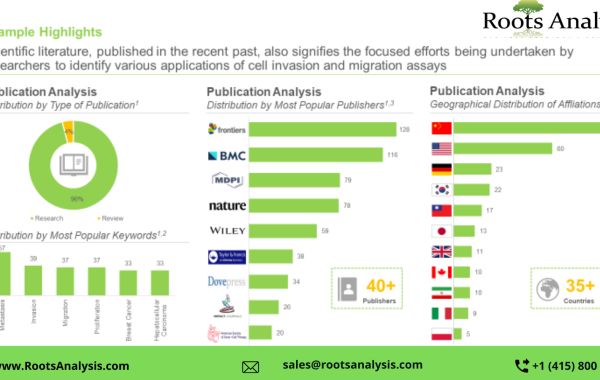London
Roots Analysis has announced the addition of the “Cell Invasion and Migration Assays Market, 2022–2035” report to its list of offerings.
Owing to several advantages offered by cell invasion and migration assays in analyzing and quantifying cellular mechanisms, industry stakeholders have undertaken numerous RD initiatives focused on exploiting the use of such assays to expediate discovery timelines and optimize the total development cost. Considering the various advantages offered by these cell-based assays, researchers across the globe have undertaken several initiatives to use these platforms for the diagnosis of a myriad of disease indications. The advancements in various technologies have propelled life science companies to use these assays in the drug discovery process, to enable the identification of potential lead candidates.
Key Market Insights
Presently, more than 80% of the total assay providers are based in North America
This segment of the industry is dominated by the presence of companies that were established pre-2000 (64%), followed by firms established during 2000-2010 (27%). In addition, most of the players engaged in this domain are small firms (less than 100 employees), representing over 45% of the total assay providers.
Currently, over 80 cell invasion and migration assays are available in the market
It is worth noting that most of the cell invasion and migration assays are currently being used for tumor studies (89%), followed by those employed for screening purposes (79%). Further, most of the assays are being developed for adherent cell cultures (48%), followed by those being manufactured for both adherent and suspension cell cultures (40%).
55% players claim to be capable of offering both cell invasion as well as cell migration assays
64% of the cell invasion and migration assays can be stored under frozen temperature (-18°C to -40°C), followed by those stored under refrigerated conditions (+1°C to +18°C) (36%). Further, it is worth noting that most of the cell invasion and migration assays are being used to conduct 100 tests (37%). This was followed by assays being developed to conduct 12 (35%) and 96 tests (23%).
Over 650 articles focused on cell invasion and migration assays have been published, since 2021
Majority of the scientific literature published in this domain was focused on research (96%), followed by review articles (4%). It is worth mentioning that articles related to cell invasion and migration assays have been affiliated by over 300 universities.
Patents filed / granted for cell invasion and migration assays have increased at a CAGR of more than 45%, since 2017
Of the total, around 55% of the patents were applications, followed by those that have been granted approval (45%). Around 63% of these intellectual property documents were filed / granted in North America; with the maximum number of patents having been filed in the US, since 2017.
More than 690 grants have been awarded to support the ongoing research efforts in this domain
Several non-profit organizations have extended financial support to aid the research related to cell invasion and migration assays. It is worth mentioning that NCI emerged as the most prominent non-profit organization, having awarded over 60% of grants, followed by NIGMS (17%).
North America and Asia-Pacific are anticipated to capture over 70% of the market share, in 2035
In terms of type of assay, the current market is driven by cell invasion assays (56%); this trend is unlikely to change in the foreseen future. Further, based on application area, assays intended for tumor studies are likely to have the maximum revenue generation potential (64%) in the overall market in 2035.
To request a sample copy / brochure of this report, please visit this
https://www.rootsanalysis.com/reports/cell-invasion-and-migration-assays-market/request-sample.html
Key Questions Answered
- Which companies are engaged in offering cell invasion and migration assays kits?
- What is the most common assay format (in terms of number of wells) offered by cell invasion and migration assay providers?
- What are the key geographical regions where cell invasion and migration assay providers are located?
- What is the evolving trend of publications focused on cell invasion and migration assays?
- Which companies are actively filing patents to drive innovation in the field of cell invasion and migration assays?
- What are the key factors influencing the price of cell invasion and migration assays?
- What are the key challenges associated with cell invasion and migration assays?
- How is the current and future market opportunity likely to be distributed across key market segments?
The financial opportunity within the cell invasion and migration assays market has been analyzed across the following segments:
- Type of Assay
- Cell Invasion Assay
- Cell Migration Assay
- Application Area
- Drug Discovery
- Screening
- Tumor Study
- Detection Method Used
- Colorimetry
- Fluorometry
- Key Geographical Regions
- North America
- Europe
- Asia-Pacific
- Latin America
- MENA
- Rest of the World
The report includes profiles of key players (listed below); each profile features an overview of the company, details related to its product portfolio dedicated to cell invasion and migration assays, recent developments and an informed future outlook.
- Abcam
- BioVision
- Enzo Life Science
- MilliporeSigma
- RD Systems
- Sigma-Aldrich
For additional details, please visit
https://www.rootsanalysis.com/reports/cell-invasion-and-migration-assays-market.html
or email sales@rootsanalysis.com
You may also be interested in the following titles:
- Targeted protein degradation market, 2022-2035
- Single-Use Upstream Bioprocessing Technology / Equipment Market, 2022-2035
About Roots Analysis
Roots Analysis is one of the fastest growing market research companies, sharing fresh and independent perspectives in the bio-pharmaceutical industry. The in-depth research, analysis and insights are driven by an experienced leadership team which has gained many years of significant experience in this sector.
Contact:
Ben Johnson
+1 (415) 800 3415
+44 (122) 391 1091







